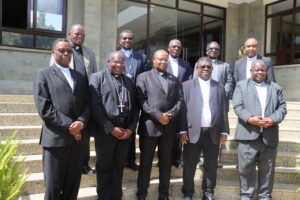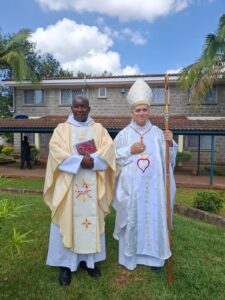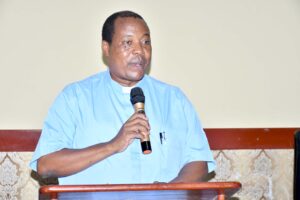KENYA: ACWECA’s First Chapter Celebration training calls for openness to the Holy Spirit
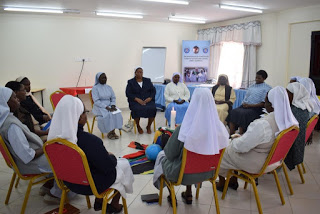
A section of the Participants of the First Chapter Celebration Training
ACWECA’s Chapter celebration training module one has come to an end with a call to participants to go with an open mind and heart to enable the Holy Spirit to guide and lead them in fruitful chapter celebration.
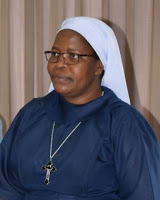
Secretary General ACWECA
The call was made by the Secretary General of the Association of Consecrated Women in Eastern and Central Africa, (ACWECA) Sr. Eneless T. Chimbali at the closure of a three weeks’ training at the Organisation’s Secretariat at Ongata Rongai in Nairobi, Kenya.
“We have listened to several speakers but there was one thing stressed by all: ‘Celebrate Chapters with due diligence,’” Sr. Chimbali re-echoed, adding that it was a time of renewal for our Institutes.
“There were indeed so many things that we learnt and if these will enhance the way our Institutes in the region celebrate Chapter, then the training would have been a success,” she said.
The training which was the first phase of a six-week training is referred to as “Celebrating a fruitful Chapter”, and is divided into two shifts of three weeks each. The training drew eleven (11) participants from the countries of Malawi, Tanzania, Uganda and Zambia.
The Secretary General who attended the sessions said she believed the participants had acquired skills and knowledge in Chapter celebration, but advised them to be gentle and go slow since everyone is not at the same level. She said the challenge however would be if those who have acquired the knowledge and skills in Chapter celebration would not be willing to share these skills.
She called on the participants to encourage others to participate in the programme, saying it would help ACWECA to engage them in discussions so as to change our way of celebrating chapter for the better.
The Malawian nun who is a member of the Servants of the Blessed Virgin Mary, (SBVM) also observed that there was plenty of knowledge and skills in the region. “As we have shared in the past three weeks, it’s clear that there is plenty of knowledge and skills in our region that we can share,” she said.
She said in the spirit of our mission, ACWECA would always promote collaboration and sharing of
spiritual, human and economic resources among member conferences to enhance religious formation and strengthen leadership capacity for deeper evangelization. This, she said was aimed at meeting the needs of religious Institutes in the region.
Saying that in all, the training would take six weeks and Sr. Chimbali called on the participants to encourage others to seize the opportunity to participate in course.
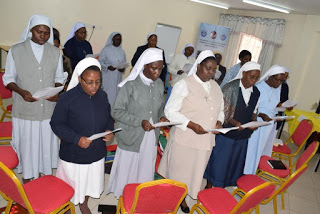
Meanwhile she thanked participants for responding generously to the call to participate in the programme. “You are the first group of this programme and you are therefore our ambassadors to the other sisters in the region,” she said, adding that the programme would always be held at the Secretariat. She explained that the Secretariat had limited facilities, and she thanked the participants for accepting to live in this humble environment.
Sister Margaret Uraa who was one of the facilitators challenged the participants to use the skills they have learnt. “Where called upon, please use the skills whether in your own communities or in other congregations and see how you can begin applying those skills,” said Sr. Uraa, a member of the Missionary Sisters of Mary Mother of the Church.
In an earlier interview, the Secretary General said the Leadership for Mission, (LM) Programme, of which “Celebrating a fruitful Chapter” is a component was a response to a felt need. She explained that the need for leadership training was expressed by leaders of Religious institutes who found themselves in leadership positions without prior preparation.
As a result, the 13th ACWECA Plenary Assembly held in Tanzania mandated the then secretary General to source for funds to organise formation programmes for superiors and provincials. And according to Sr. Chimbali, Hilton Fund for Sisters has been the key partner funding these leadership formation programmes
But during the implementation of the 2011- 2016 strategic plan, she said ACWECA leadership and administration observed that the sisters in the region still needed more support on leadership formation. This was aimed at promoting effective leadership in the region, national associations and in the Congregations. And when ACWECA prepared its 2017-2022 Strategic Plan, leadership formation featured as one of the key areas to be addressed.
“This programme is aimed at addressing gaps in areas of Chapter Celebration, formation, governance and sustainability and the administration of temporary good,” a document on the Organisation’s brochure partly read.
Besides fostering effective leadership, the other key objectives of the programme are strengthening initial and on-going formation and fostering self-sustenance in the National Associations and in the Religious Institutes.
But in all, the LM programme has five components and one of which empowers leaders in “exercising the power they have received from God through the ministry of the Church in a spirit of service.” This five-day programme targeting superiors who have newly been elected to the leadership of their Institutes helps them with skills on how to take on their new responsibilities.
Another programme that targets superiors helps to empower them with skills to administer the temporary goods of their institutes and sustainably manage those goods. And according to the Coordinator of the programme, Sr. Jacinta Auma Opondo, FSSA the temporary goods of a religious Institute are means that help religious Institutes to realise their mission based on their patrimony. She further explained that the temporary goods of an Institute would include its assets (the movable and the non-movable assets – emphasis by the writer) including the human resource – i.e. members of the institute, among others.
And also importantly, one of the modules of the programme trains superiors on how to gracefully hand over the custodianship of the patrimony of the institutes to the next leadership.
Although the Leadership for Mission programmes are specifically targeting superiors and sisters who have matured in their vocation, participants who have attended some components of the programme said that it would be beneficial for all sisters.
“The content of this programme is so rich that it would benefit all sisters,” a participant observed. Sister Carmel Abwot of the Little Sisters of Mary Immaculate of Gulu in Uganda could not agree more. She said the three weeks training felt more like a spiritual retreat. And another participant, Sr. Hilda Bamwine of the Society of the Sacred Heart Sisters added: “At one time when the participants came for lunch, I saw people whispering as if they were for a spiritual retreat and to me that spoke volumes.”
∽End∽
By Sr. Grace Candiru, MSMMC, ACWECA Communication Officer.
